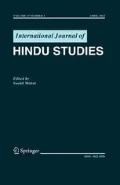Abstract
In the context of the South Indian Gaṅgamma grāmadevata (village goddess) tradition, this article asks: what can ethnographers learn by thinking theologically, an orientation that is identified as theological ethnography. Within this analytic perspective, the ethnographer looks and listens for ways in which worshipers ritually perform and narrate their own theologies about the goddess, but does not create theological analyses for that community. The article further asks what we can learn about the goddess—her agency and its limits, the ways in which she acts and moves in the human world, her desires, and her motivations to possess devotees—by listening to personal narratives of women so possessed. These narratives are forms of vernacular theology and imply a dialogic agency between humans and goddess. They help us to answer what both the goddess and humans gain (and may lose) when Gaṅgamma enters the human world through possession in/of and in the presence of human bodies. To imagine, describe, and analyze a world in which gods/goddesses are active agents is a theological move, and also one mode of good ethnography.
Similar content being viewed by others
References Cited
Arweck, Elisabeth and Martin D. Stringer, eds. 2002. Theorizing Faith: The Insider/Outsider Problem in the Study of Ritual. Birmingham: University of Birmingham Press.
Cabezón, José Ignacio and Sheila Greeve Davaney. 2004. Identity and the Politics of Scholarship in the Study of Religion. New York: Routledge.
Diakité, Dianne M. Stewart. 2010. “The Limits of Theology: Notes from a Theographer.” Practical Matters 3: 7–9.
Engelke, Matthew. 2007. A Problem of Presence: Beyond Scripture in an African Church. Berkeley: University of California Press.
Ergun, Ayça and Aykan Erdemir. 2010. “Negotiating Insider and Outsider Identities in the Field: ‘Insider’ in a Foreign Land; ‘Outsider’ in One’s Own Land.” Field Methods 22, 1: 16–38.
Flueckiger, Joyce Burkhalter. 2006. In Amma’s Healing Room: Gender and Vernacular Islam in South India. Bloomington: Indiana University Press.
Flueckiger, Joyce Burkhalter. 2013. When the World Becomes Female: Guises of a South Indian Goddess. Bloomington: Indiana University Press.
Flueckiger, Joyce Burkhalter. 2015. Everyday Hinduism. London: Wiley-Blackwell.
Hancock, Mary E. 1995. “The Dilemmas of Domesticity: Possession and Devotional Experience among Urban Smārta Women.” In Linsey Harlan and Paul B. Courtright, eds., From the Margins of Hindu Marriage: Essays on Gender, Religion, and Culture, 60–91. New York: Oxford University Press.
Keller, Mary. N.d. “The Indigeneity of Spirit Possession.” Unpublished manuscript.
Keller, Mary. 2002. The Hammer and the Flute: Women, Power and Spirit Possession. Baltimore: Johns Hopkins University Press.
Luhrmann, T. M. 2012. When God Talks Back: Understanding the American Evangelical Relationship with God. New York: Vintage Books.
McCutcheon, Russell T. 2001. Critics Not Caretakers: Redescribing the Public Study of Religion. Albany: State University of New York Press.
Prasad, Leela. 2007. Poetics of Conduct: Oral Narrative and Moral Being in a South Indian Town. New York: Columbia University Press.
Ram, Kalpana. 2013. Fertile Disorders: Spirit Possession and Its Provocation of the Modern. Honolulu: University of Hawaii Press.
Ramanujan, A. K. Speaking of Siva. 1973. New York: Penguin Books.
Saliers, Don E. 2010. “On Some Relations Between Theology and Ethnography.” Practical Matters 3: 2–3.
Sax, William S. 2009. God of Justice: Ritual Healing and Social Justice in the Central Himalayas. New York: Oxford University Press.
Smith, Frederick M. 2006. The Self Possessed: Deity and Spirit Possession in South Asian Literature and Civilization. New York: Columbia University Press.
Taylor, Mark C. 2009. “Refiguring Religion.” Journal of the American Academy of Religion 77, 1: 105–19.
Author information
Authors and Affiliations
Corresponding author
Rights and permissions
About this article
Cite this article
Flueckiger, J.B. When the Goddess Speaks Her Mind: Possession, Presence, and Narrative Theology in the Gaṅgamma Tradition of Tirupati, South India. Hindu Studies 21, 165–185 (2017). https://doi.org/10.1007/s11407-017-9210-4
Published:
Issue Date:
DOI: https://doi.org/10.1007/s11407-017-9210-4




